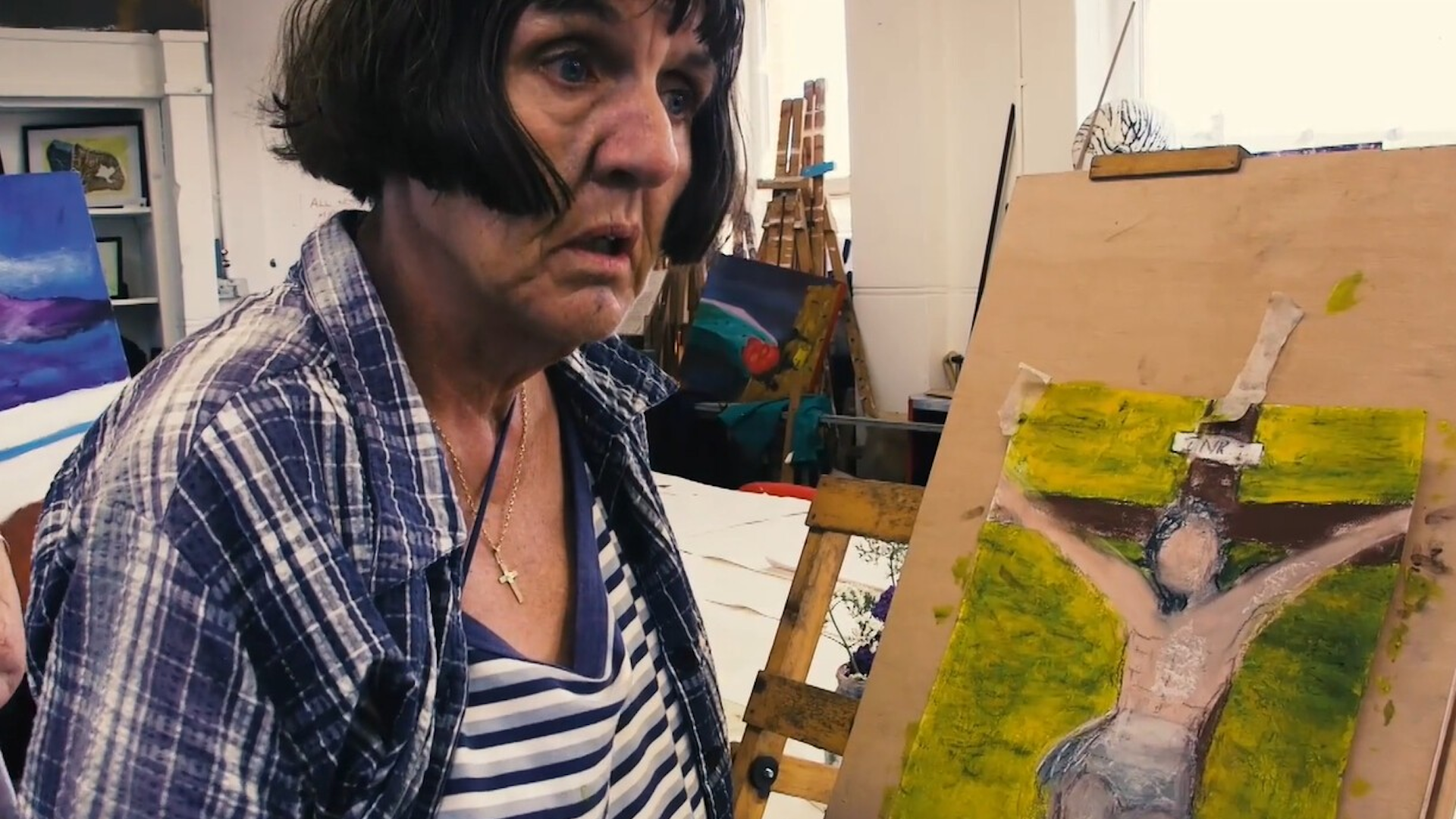Pauline was awarded PIP but only after she was diagnosed with cancer. She died four months later aged 57 in a shock to all of her family, including her sister-in-law Tracy Willits, who is also the filmmaker who created the documentary.
“It was really difficult,” Willits says as she remembers Pauline’s death. “We went to the funeral and the numbers of people who could go were very limited. George [Pauline’s fiancé] was howling. Emotionally, it was really difficult. It was such a surprise. Sometimes I’m fine about this and sometimes it really gets to me, even now.
“Pauline was so positive. And at the end of her life, she had to deal with PIP and be grateful for getting benefits at the end of her life because she was diagnosed with cancer. Even then, she was cracking jokes about having a crush on the psychiatrist. I have so much admiration for her.”
Just 41% of people are awarded PIP if claiming for the first time, but the success rate of those who appeal PIP decisions is around 70%. As the Big Issue has previously reported, the appeals process can be “traumatic”, lengthy and put people off challenging their decision.
“Did I get it? No I didn’t,” Pauline said after being denied PIP. “I got turned down for it. I have appealed but I might have to wait for up to even a year.”
A spokesperson for the Department for Work and Pensions (DWP) said: “We support millions of people every year and our priority is that they receive a timely, supportive and compassionate service.
“PIP entitlement is assessed by healthcare professionals and decisions are made using all the available information. If someone disagrees with a decision, they can ask for this to be reconsidered and appeal to an independent tribunal.”
Pauline’s humour and resilient personality shines through the documentary, as does her love for life and her happiness in her relationship with George. But PIP, Pop and a Pandemic is also a harrowing depiction of how people with schizophrenia are treated in the UK. Pauline was sent to a mental health hospital when she was 22 after multiple attempts to die by suicide, and she was given electric shock treatment.
“A serious mental illness such as schizophrenia is often forgotten about because it’s not as common,” Willits says. “I think most people don’t have a voice. Nobody’s listening to them. They always get the raw deal. These particular people with schizophrenia aren’t going to be a harm to anybody, but they’re vulnerable and they don’t get they don’t get the help they deserve.”
The documentary also highlights the story of Ed and his wife Catarina, whose names have been changed to protect their identity. They have been married for 22 years but Catarina is not a British citizen. She has had leave to remain for the last eight years and she would be entitled to work, but she is not capable of that because of her health.

She cannot get benefits so the couple are solely reliant on Ed’s universal credit. He was a guitar teacher and used to play alongside famous bands in the 80s, but his pupils cancelled lessons when Catarina’s health deteriorated. She has schizophrenia and Ed is her carer.
“She spits on the floor,” Ed tells the Big Issue. “The toilets aren’t flushed. She’s always switching the lights on even in the middle of the night. She’s got a lot of habits but she doesn’t mean any harm. There are clothes all over the place. She goes to the toilet on the floor sometimes and I have to clean it up. I know it sounds terrible but it’s an illness.”
Research from the Joseph Rowntree Foundation shows that universal credit falls short by £30 for a single person just to afford the essentials they need to survive alone. Ed has to make his benefits stretch between two of them.
One of the symptoms of Catarina’s illness is that she wastes food. It makes affording the essentials even more difficult, especially as Ed is not entitled to carer’s allowance. He has osteoporosis and he gets medication for depression and anxiety, but he was denied PIP.
“I pay the rent,” he says. “I pay the electric and water. I’ve hardly got anything left. The only luxury I’ve got is the computer, the television and this telephone. I need the computer because the Jobcentre contacts you on the computer. I pay the bills and there’s hardly anything left.”
The Home Office does not routinely comment on individual cases, but a spokesperson told the Big Issue: “Our expectation is that in general migrants coming to the UK should be able to maintain and accommodate themselves without recourse to public funds.”
Willits is pushing for change. She is working with the Institute for Health and Care Improvement at York St John University, where she is a lecturer in media production, calling on the government to make immediate steps to improve the lives of people with serious mental illnesses and their carers.
This includes introducing specialist appointments to help people fill out necessary forms such as applications for PIP and carer’s allowance, as well as providing a welfare adviser for people with long-term illness to avoid the stress of having to retell their story to PIP assessors.
Willits also calls for increased support from GPs and for medical professionals to actively seek out and encourage people to get assessed as carers. The ultimate hope is for reform of the benefits system to make it more supportive for people like Pauline, Catarina and Ed.
Instead, Sunak wants to strip GPs of their power to sign people off work, and people who are still out of work a year after support from a work coach face having their benefits removed.
“The government is intending to get people off sickness benefits and into work, and that’s a real worry because that means more stress and people like Pauline being questioned and forced back into work,” Willits says. “That could have really negative consequences. It’s not that they don’t want to work. They aren’t capable of working.
“When you see how people are treated with mental illness when it comes to benefits, it doesn’t give you much hope about any compassion. At the moment, the system discriminates against people with mental illness.”
Do you have a story to tell or opinions to share about this? We want to hear from you. Get in touch and tell us more.

Sophie Anderson, a UK-based writer, is your guide to the latest trends, viral sensations, and internet phenomena. With a finger on the pulse of digital culture, she explores what’s trending across social media and pop culture, keeping readers in the know about the latest online sensations.








